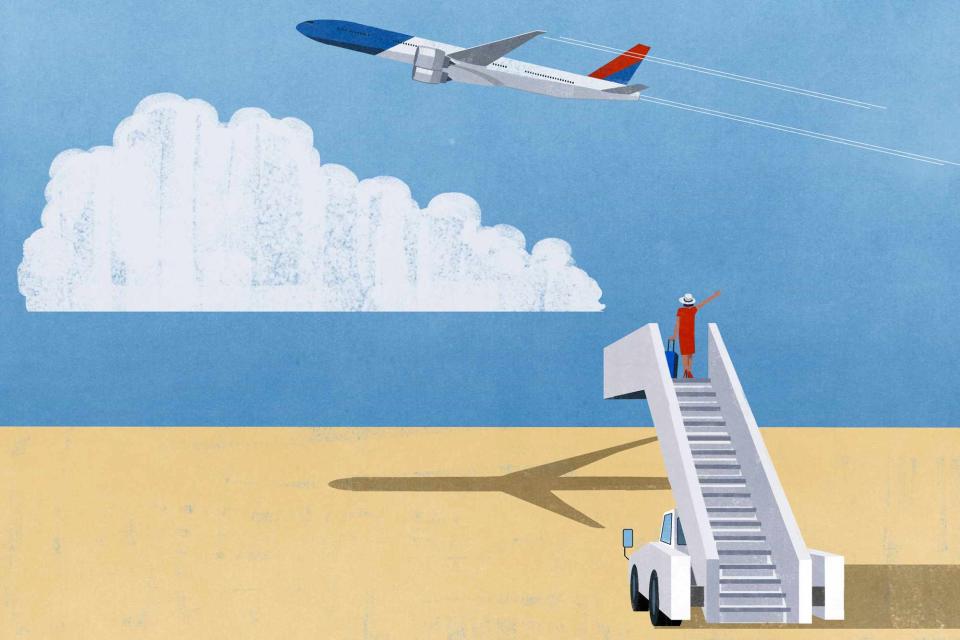What You Need to Know about Travel Insurance — Before You Leave for Summer Vacation
Travel insurance is surging in popularity and giving us all the peace of mind we need to get back out there.

Illustration by SHOUT
Leslie Wahlgren has worked as a travel advisor for nearly 20 years, long enough to have seen plenty of ups and downs, including the roller coaster of the pandemic. Never before, she says, have her clients been more interested in travel insurance than they are right now.
“Just yesterday I sold five policies,” says the Los Angeles–based advisor, who’s part of Plaza Travel.
“People are more aware of what’s happening in the world,” Wahlgren notes, “but they still want to go on trips — and they can, because of the peace of mind travel insurance provides.”
While COVID-19 remains a concern, many people these days are equally worried about flight delays, cancellations, missed connections, and lost bags, according to data from Squaremouth, a comparison-shopping site for insurance. And while you might think of travel insurance as something that only kicks in when a trip is canceled, many policies also compensate for less serious snafus.
“Even more affordable plans that don’t insure a trip’s full cost may include coverages such as medical, travel delay, and baggage protection,” says Megan Moncrief, chief marketing officer of Squaremouth. “I personally insure almost all of my travels — not necessarily for cancellation benefits, but for delay and baggage coverage.”
Affordable plans from major providers such as AIG Travel, Allianz Partners USA, Berkshire Hathaway Travel Protection, Nationwide, and Seven Corners will pay in the event of many common air-travel nightmares.
Depending on the policy, even these affordable plans can cover a wide range of scenarios, refunding prepaid expenses whether a trip is impacted by, say, a predeparture injury or a flight missed because of a surprise storm.
“Don't skimp on coverage as there's no point paying for a policy that doesn't protect you,” says Meredith Mangan, the senior insurance editor at Investopedia. “Check policy limits on all coverages before you buy. For example, some policies only cover up to $2,500 for trip interruption, which may be nowhere near enough.”
More expensive, full-coverage policies provide bigger payouts; they’re ideal for big-ticket trips such as safaris and luxury cruises. (Some of these operators require guests to buy insurance.)
“Everyone has a different risk threshold,” says Suzanne Sangiovese, director of travel and technology at Riskline. The company works directly with organizations such as American Express Global Business Travel and TripIt to provide intelligence on threats ranging from weather events to terrorism. “With people traveling more, they’re seeing that even if things do go wrong, they have insurance in place to protect them. So that risky situation doesn’t have to be a disaster.”
For those seeking maximum assurance, costly yet comprehensive “cancel for any reason” policies allow exactly that, often up until 48 hours before departure. (Sometimes even until the very last minute.) This sort of coverage typically refunds most — but not all — expenses, such as prepaid hotel rooms, plane tickets, and other nonrefundable expenses incurred before departure.
Other insurers speak to niche interests. World Nomads, for example, specializes in adventure trips, covering heart-thumping pursuits such as rock climbing, scuba diving, hang gliding, and snowmobiling, which are often excluded from standard policies.
“Many travel insurance policies won't cover adventure activities like surfing, diving, bungee jumping, or parasailing,” Mangan notes.
Medjet, meanwhile, focuses on medical evacuations, covering policyholders anytime they’re 150 or more miles from home. Unlike some travel insurance, the company’s MedjetAssist plan covers the cost of flying travelers home for hospital treatment. The company also has a broader option, MedjetHorizon, which includes “crisis response,” including evacuation in the event of a natural disaster, crime, or civil unrest.
It’s popular with Wahlgren’s clients, at least one of whom had to make use of the policy. “He was hospitalized the night before he was supposed to come home,” she recalls. “Once he was stable, they flew him home to the hospital of his choice, a doctor was with him on the plane, and everything was covered.”
A version of this story first appeared in the June 2023 issue of Travel + Leisure under the headline “In Case of Emergency.”
For more Travel & Leisure news, make sure to sign up for our newsletter!
Read the original article on Travel & Leisure.

